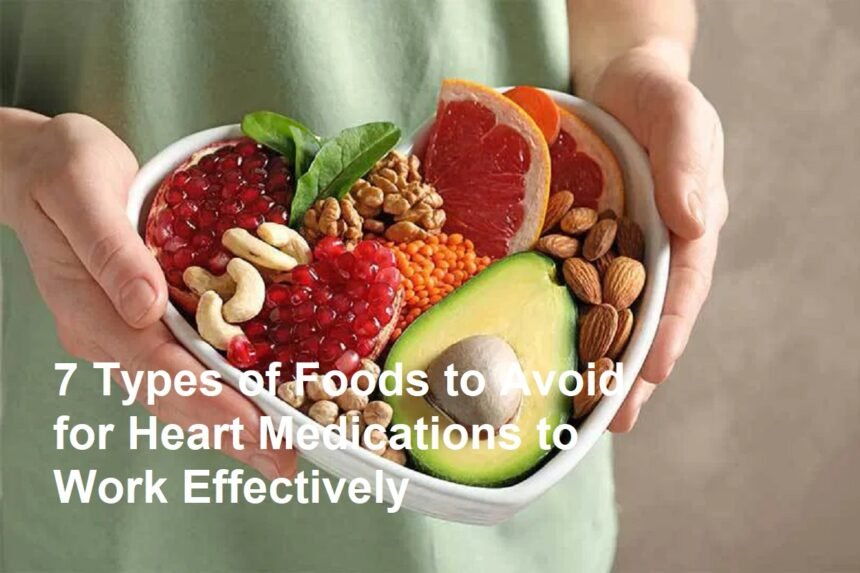Introduction
When you’re on heart medication, your diet plays a bigger role than you might think. While the pills are meant to help your heart function better, some foods can interfere with how they work, reduce their effectiveness, or even cause unwanted side effects.
In this article, we’ll explore 7 types of foods to avoid for heart medications to work effectively and answer two key questions: Which foods should you stay away from to make heart therapy safe and effective? and how can you maintain long-term heart health through better habits?
Why Food Choices Matter in Heart Therapy
Every bite you take can affect how medications are absorbed and processed in your body. Some foods may increase side effects, while others may block the drug from doing its job. That’s why being mindful of your diet isn’t just about general health—it’s part of your therapy plan.
7 Types of Foods to Avoid for Heart Medications to Work Effectively
1. Grapefruit and Grapefruit Juice
Grapefruit is often seen as healthy, but when it comes to heart medications, it can be dangerous. Grapefruit contains compounds that interfere with enzymes in your liver, making it harder for your body to process drugs.
Why it matters: It can cause too much medication to stay in your system, leading to side effects.
Practical tip: Switch to safer alternatives like oranges or apples if you want fresh fruit.
2. High-Salt Processed Foods
Too much sodium can raise blood pressure and make it harder for heart medications—especially those for hypertension or heart failure—to do their job.
Why it matters: High salt intake counters the effects of drugs that aim to lower blood pressure.
Practical tip: Limit packaged snacks, instant noodles, canned soups, and fast food. Instead, season meals with herbs and spices.
3. Foods Rich in Vitamin K (in Excess)
If you’re on blood thinners like warfarin, eating too much vitamin K can reduce their effectiveness. Foods like spinach, kale, and broccoli are nutritious but must be eaten in consistent amounts.
Why it matters: Sudden changes in vitamin K intake can disrupt your medication’s stability.
Practical tip: Don’t eliminate greens, but keep your intake steady. Talk to your doctor about the right balance.
4. Alcohol
Alcohol may interfere with many types of heart medications, including blood thinners, beta-blockers, and statins. It can also strain your heart directly.
Why it matters: Alcohol can increase side effects like dizziness, bleeding risk, or liver damage.
Practical tip: If you drink, do it only in moderation—or better yet, avoid it altogether while on heart therapy.
5. High-Fat Fried Foods
Deep-fried and greasy foods not only increase bad cholesterol but can also slow down how your body processes medications.
Why it matters: They add extra strain on your cardiovascular system, reducing the overall benefits of treatment.
Practical tip: Choose baked, grilled, or steamed dishes instead of fried.
6. Black Licorice
It may sound surprising, but black licorice contains glycyrrhizin, which can interact with heart medications and cause irregular heart rhythms or blood pressure spikes.
Why it matters: Even small amounts can be risky for people with heart conditions.
Practical tip: Read labels carefully—licorice is sometimes added to candies, teas, or herbal products.
7. Excessive Caffeine
Coffee, energy drinks, and strong teas might seem harmless, but too much caffeine can increase heart rate and blood pressure. It may also reduce the effectiveness of some heart drugs.
Why it matters: Overstimulation of the heart counteracts the calming effects of certain medications.
Practical tip: Limit your caffeine intake to a moderate level—about one to two cups of coffee per day.
How to Maintain Heart Health Alongside Medication
Now that we’ve seen what to avoid, let’s shift focus to how to care for your heart while on medication.
1. Stick to a Heart-Friendly Diet
- Eat more whole grains, lean proteins, fruits, and vegetables.
- Reduce processed and sugary foods.
- Choose healthy fats like olive oil, nuts, and avocado.
2. Stay Physically Active
Light to moderate exercise, like brisk walking or cycling, can strengthen your heart and support medication effectiveness.
3. Manage Stress
Chronic stress can weaken your heart over time. Meditation, deep breathing, or even short breaks during the day can make a big difference.
4. Regular Check-Ups
Never adjust your medication or diet drastically without talking to your doctor. Regular check-ups ensure that your therapy is on track.
Conclusion
When it comes to heart therapy, your medication does half the work—your lifestyle does the rest. By avoiding the 7 types of foods to avoid for heart medications to work effectively, you can make sure your treatment is safer and more successful.












